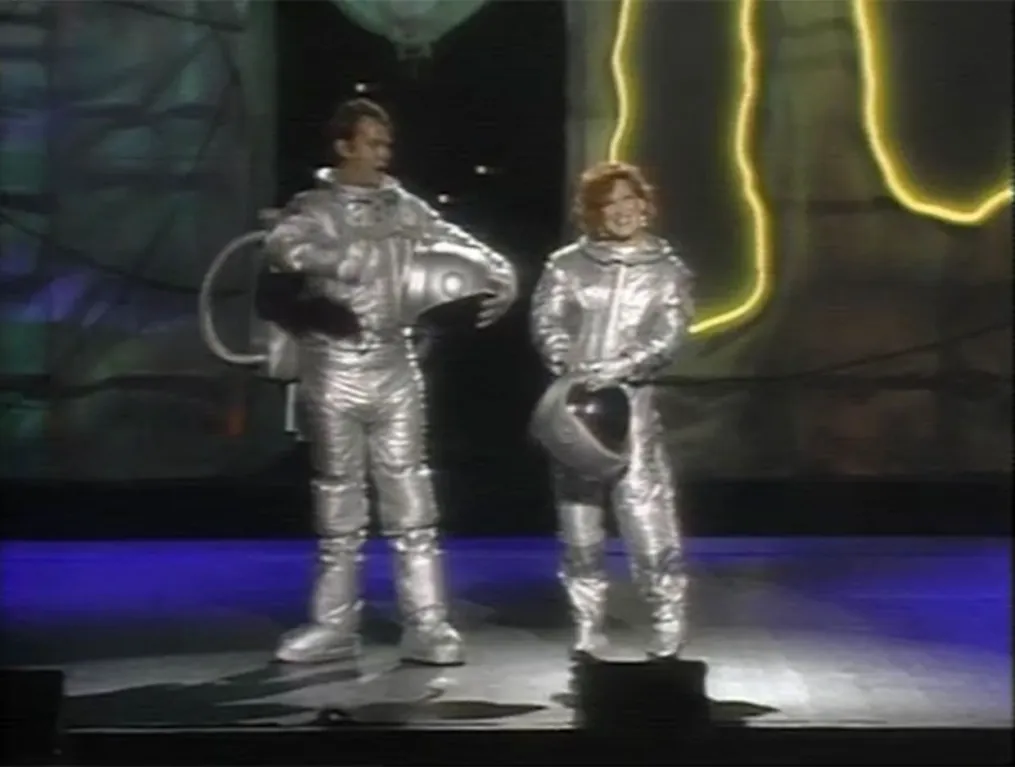Camping it up: The pride of pop’s history
By PHILIP BRASOR
Special to The Japan Times

Photo Collage: Lucy Wilkins
Scissor Sisters have been described as a band who play “camp pop.” The camp bit is arguably a redundant designation since it derives from the French “camper,” which means to pose in an exaggerated fashion. All pop music is a pose — a good deal of it an exaggerated one. A narrower definition of camp holds that it is performance-based. In her famous 1964 essay on the subject, Susan Sontag called it a “sensibility” whose hallmark is a “spirit of extravagance.” In pop music, this translates as gestures that call attention to themselves. Camp in its most recognizable form sprang from gay entertainment forms like drag shows. Considered a touchstone of postmodern pop culture, the truth is that camp hasn’t really changed that much over the years.
Carmen Miranda: The “Brazilian bombshell” ‘s early camp icon status is usually attributed to her platform shoes and towering stacked-fruit hats, but it was her Latin accent that drove Americans wild.
Liberace: The first glitter performer, Wladziu “Lee” Liberace was a classical pianist who found that his pop-music encores got a better response. His extravagant taste in clothing, jewelry and stage props were just as famous as his playing style — while dashing off a concerto, he’d wink at the audience. Though he was a closeted gay man, his popularity was rooted in Middle America, and his style influenced everyone from Elton John to Bowie to the Vegas incarnation of Elvis.
Little Richard: The campiest of rock ‘n’ roll’s originators, and not just because of his fashion sense and effeminate manner, Richard Penniman was also the hardest rocking performer of his day — a black man who reduced everything to its most stimulating elements, including the lyrics. What’s more camp than “Tutti Frutti,” except the idea of Pat Boone scoring a hit with it?
Cher: Hippie style was itself a form of camp — the long hair, beads, slang and professions of free love all co-opted from gay culture — but Cher’s camp credentials had less to do with her phony Bohemian image as half of Sonny and Cher in the ’60s than her vocals — not her stentorian delivery but her pronunciation, those amazing diphthongs.
Liza Minnelli: The triumvirate of all drag lip-syncers is Barbra Streisand, Diana Ross and Liza Minnelli, and Liza is the campiest. It’s not just her brassy singing and preference for schlock. Liza is the daughter of the goddess of camp, Judy Garland, and every damaged-star cliche that applied to her mother has afflicted her as well.
Bette Midler: The most self-conscious camp pop singer, the Divine Miss M came to New York in her early 20s to act on Broadway and ended up singing in a gay bathhouse with Barry Manilow as her accompanist. She does everything from ’40s swing to treacly soft rock in the same theatrical frame of mind. It is not at all ironic that she is an icon to both gay men and the Walt Disney Company.
Freddie Mercury: Like Liberace, Queen’s front man embodied all the cliches of gay performance culture, and like Liberace he died of AIDS without publicly acknowledging his homosexuality. His baroque arrangements and grandiose sentiments did more than any other rock star to turn straight white boys on to musical theater, even if they didn’t know it.
The B-52s: The beehive hairdos are too obvious. This New Wave group was the campiest rock act ever — combining spy-movie guitar with ’60s girl-group sass all boiled down to dance music. Fred Schneider’s dork-femme vocals are so original they have yet to be copied.
Poison: The New York Dolls were the first macho hard-rock act to embrace camp, and if Kiss seemed the epitome of the concept they had nothing on the heavy metal acts of the ’80s. Poison used all the ambisexual camp elements — the makeup, the fluffy hair, the Spandex — to play the role of bad boys to the hilt.
Britney Spears: Her music conflates gay disco with teen mall culture, and her image, both onstage and off, is that of a pure-hearted suburban princess who is also tabloid slease fodder. Already married and split twice at the age of 25, she’s the new Liza.






